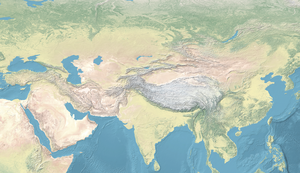Kucha 龜茲 | |||||||
|---|---|---|---|---|---|---|---|
| 2nd century BCE–648 CE | |||||||
Tarim Basin in the 3rd century | |||||||
 | |||||||
| Religion | Buddhism | ||||||
| Demonym(s) | Kuchean | ||||||
| History | |||||||
• Established | 2nd century BCE | ||||||
| 648 CE | |||||||
| Population | |||||||
• 111 CE | 81,317 | ||||||
| Currency | Kucha coinage | ||||||
| |||||||
| Today part of | China | ||||||
Kucha or Kuche (also: Kuçar, Kuchar; Uyghur: كۇچار, Кучар; Chinese: 龜茲; pinyin: Qiūcí, Chinese: 庫車; pinyin: Kùchē; Sanskrit: 𑀓𑀽𑀘𑀻𑀦, romanized: Kūcīna)[1] was an ancient Buddhist kingdom located on the branch of the Silk Road that ran along the northern edge of what is now the Taklamakan Desert in the Tarim Basin and south of the Muzat River.
The former area of Kucha now lies in present-day Aksu Prefecture, Xinjiang, China. Kuqa town is the county seat of Aksu Prefecture's Kuqa County. Its population was given as 74,632 in 1990.
- ^ "中印佛教交通史". Archived from the original on 2016-03-03. Retrieved 2011-03-20.

